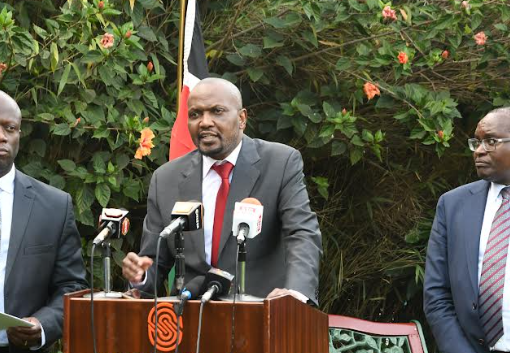The Ministry of Industry, Trade and Cooperatives is in the process of starting a construction of Special Economic Zones (SEZ) intending to expand trade and give Kenyans job opportunities.
The construction that will begin on August 1, 2019 is targeting six counties which include Lamu, Mombasa, Kisumu, Uasin Gichu, Kiambu and Naivasha in Nakuru County.
The Industrilisation, Trade and Cooperative Cabinet Secretary (CS), Peter Munya, said today that these SEZ will position Kenya as a gateway in Eastern Africa in terms of trade.
Munya who was speaking during a media briefing on the ministry progress on programmes today, further stated that Kenya seeks to achieve an upper middle-income with economic status of above Ksh.380, 000 per capita from the current about Ksh.170,000 per capita.
“Kenya’s exports grew in value from Ksh.594 billion in 2017 to Ksh.613 billion in 2018 representing a 3.2 percent
increment,” he said.
According to Munya, the SEZ will be a free zone for companies to operate and expand the Export Processing Zones (EPZ) to net more foreign exchange.
“The EPZ exports grew by 26 percent in 2018 amounting to Ksh.42 billion creating 46,248 jobs and we are gearing up to be the headquarters of free zone trade,” he added.
The CS also expressed their interest in supporting the growth of Micro, Small and Medium Enterprises (SMEs) with the view to increase productive exporting enterprises to earn Kenya the most foreign exchange and bridge the trade deficit.
“It is our mission to expand investment opportunities in production and service sector towards meeting our export growth target by 2022,” he emphasised.
Munya explained that through the formation of Kenya Trade Remedies Agency they will be able to curb menace of illicit trade and thus assist the country in creating competitive environment for manufacturing,SMEs and large enterprises.
“We shall implement Kenya Investment Policy to ensure quality and quantity production of exportable goods,” he explained.
According to Munya forging SMART partnership with county governments and business community members will spur Kenya’s industrial transformation at the county level towards increasing value addition in manufacturing contribution to national wealth as predicted in vision 2030.
Munya also reiterated that the 2019/2020 FY budget has resulted to reduction of the Value Added Tax (VAT) withholding rate from the current six percent to two percent and prioritised payment of sh.10.9 billion of the verified pending bills before the end of June.
By Yvonne Kadzo/Purity Mumbua



